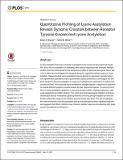| dc.contributor.author | Bryson, Bryan D. | |
| dc.contributor.author | White, Forest M. | |
| dc.date.accessioned | 2015-05-29T13:41:01Z | |
| dc.date.available | 2015-05-29T13:41:01Z | |
| dc.date.issued | 2015-05 | |
| dc.date.submitted | 2015-01 | |
| dc.identifier.issn | 1932-6203 | |
| dc.identifier.uri | http://hdl.handle.net/1721.1/97111 | |
| dc.description.abstract | Lysine acetylation has been primarily investigated in the context of transcriptional regulation, but a role for acetylation in mediating other cellular responses has emerged. Multiple studies have described global lysine acetylation profiles for particular biological states, but none to date have investigated the temporal dynamics regulating cellular response to perturbation. Reasoning that lysine acetylation may be altered in response to growth factors, we implemented quantitative mass spectrometry-based proteomics to investigate the temporal dynamics of lysine acetylation in response to growth factor stimulation in cultured carcinoma cell lines. We found that lysine acetylation changed rapidly in response to activation of several different receptor tyrosine kinases by their respective ligands. To uncover the effects of lysine acetylation dynamics on tyrosine phosphorylation signaling networks, cells were treated with an HDAC inhibitor. This short-term pharmacological inhibition of histone deacetylase activity modulated signaling networks involving phosphorylated tyrosine and thereby altered the response to receptor tyrosine kinase activation. This result highlights the interconnectivity of lysine acetylation and tyrosine phosphorylation signaling networks and suggests that HDAC inhibition may influence cellular responses by affecting both types of post-translational modifications. | en_US |
| dc.description.sponsorship | National Institutes of Health (U.S.) (Grant R24DK090963) | en_US |
| dc.description.sponsorship | National Institutes of Health (U.S.) (Grant R01CA118705) | en_US |
| dc.description.sponsorship | National Institutes of Health (U.S.) (Grant U54CA112967) | en_US |
| dc.description.sponsorship | National Institutes of Health (U.S.) (Grant U24CA159988) | en_US |
| dc.description.sponsorship | National Institutes of Health (U.S.) (Grant P30CA14051) | en_US |
| dc.language.iso | en_US | |
| dc.publisher | Public Library of Science | en_US |
| dc.relation.isversionof | http://dx.doi.org/10.1371/journal.pone.0126242 | en_US |
| dc.rights | Creative Commons Attribution | en_US |
| dc.rights.uri | http://creativecommons.org/licenses/by/4.0/ | en_US |
| dc.source | Public Library of Science | en_US |
| dc.title | Quantitative Profiling of Lysine Acetylation Reveals Dynamic Crosstalk between Receptor Tyrosine Kinases and Lysine Acetylation | en_US |
| dc.type | Article | en_US |
| dc.identifier.citation | Bryson, Bryan D., and Forest M. White. “Quantitative Profiling of Lysine Acetylation Reveals Dynamic Crosstalk Between Receptor Tyrosine Kinases and Lysine Acetylation.” Edited by Robert A Fenton. PLOS ONE 10, no. 5 (May 15, 2015): e0126242. | en_US |
| dc.contributor.department | Massachusetts Institute of Technology. Department of Biological Engineering | en_US |
| dc.contributor.department | Koch Institute for Integrative Cancer Research at MIT | en_US |
| dc.contributor.mitauthor | Bryson, Bryan D. | en_US |
| dc.contributor.mitauthor | White, Forest M. | en_US |
| dc.relation.journal | PLOS ONE | en_US |
| dc.eprint.version | Final published version | en_US |
| dc.type.uri | http://purl.org/eprint/type/JournalArticle | en_US |
| eprint.status | http://purl.org/eprint/status/PeerReviewed | en_US |
| dspace.orderedauthors | Bryson, Bryan D.; White, Forest M. | en_US |
| dc.identifier.orcid | https://orcid.org/0000-0002-1545-1651 | |
| mit.license | PUBLISHER_CC | en_US |
| mit.metadata.status | Complete | |
